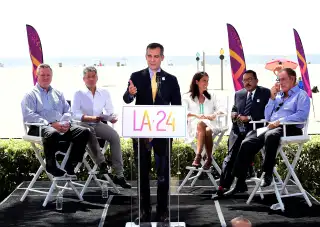Why Los Angeles Might Actually Make Money Hosting the 2024 Olympics

As the Republican primary campaigns rage on, another contest has come to a close: the choice of America's candidate for the 2024 summer Olympic games. For a while Boston led as the favorite, but the U.S. Olympic Committee has officially named Los Angeles as its contender, throwing it into the international ring(s) against Hamburg, Rome, Budapest, and Paris.
The question of whether hosting the Olympics makes financial sense has long been debated. Though it's frequently touted as an opportunity to raise a city's profile, attract tourists, and boost a mid-level city into a global powerhouse—Barcelona is a shining example—for the most part there isn't compelling evidence to show that hosting carries any long-term rewards. It's unclear, for example, if Sydney benefited in the long run, and it lost money in the short. The Athens games may have sped Greece's decline. Beijing's $44 billion production yielded a profit but had a negligible economic impact (and a negative political one, according to one critic), while Sochi has little to show for the record $55 billion 2014 winter games. People are still arguing about London, though a report commissioned by the city says it provided an economic lift; let's call it breaking even.
So why does Los Angeles think it can do any better?
Well, because the city expects to do it on the cheap. According to a financial plan released in August, the bid's organizing committee estimates the 2024 L.A. games would be the most affordable Olympics since Atlanta, with a projected cost of just $4.1 billion dollars. Though the early draft doubtless overlooks some expenses, the budget is nevertheless minuscule compared with London's $10.4 billion and Beijing's $44 billion.
The city's plan for penny-pinching rests on the fact that much of the significant infrastructure already exists. This isn't L.A.'s first rodeo; its profitable 1984 Olympics, "the most successful games ever," left the Memorial Coliseum for track events, and the city's MLS and NBA venues will negate the significant expense of erecting new stadiums. When you don't have to build a $423 million "Bird's Nest," the price tag drops considerably. For other expenses, such as the Olympic village, private companies would join in to defray the costs.
If the summer Olympics' most recent past is anything to go by, Los Angeles's proposal—which projects $4.8 billion in revenue, leaving the city $700 million in the black—seems about as bulletproof as an Olympic plan could get, which perhaps isn't saying much. But let's not forget: this is Hollywood, where putting on a great show (and working a budget) is the name of the game.